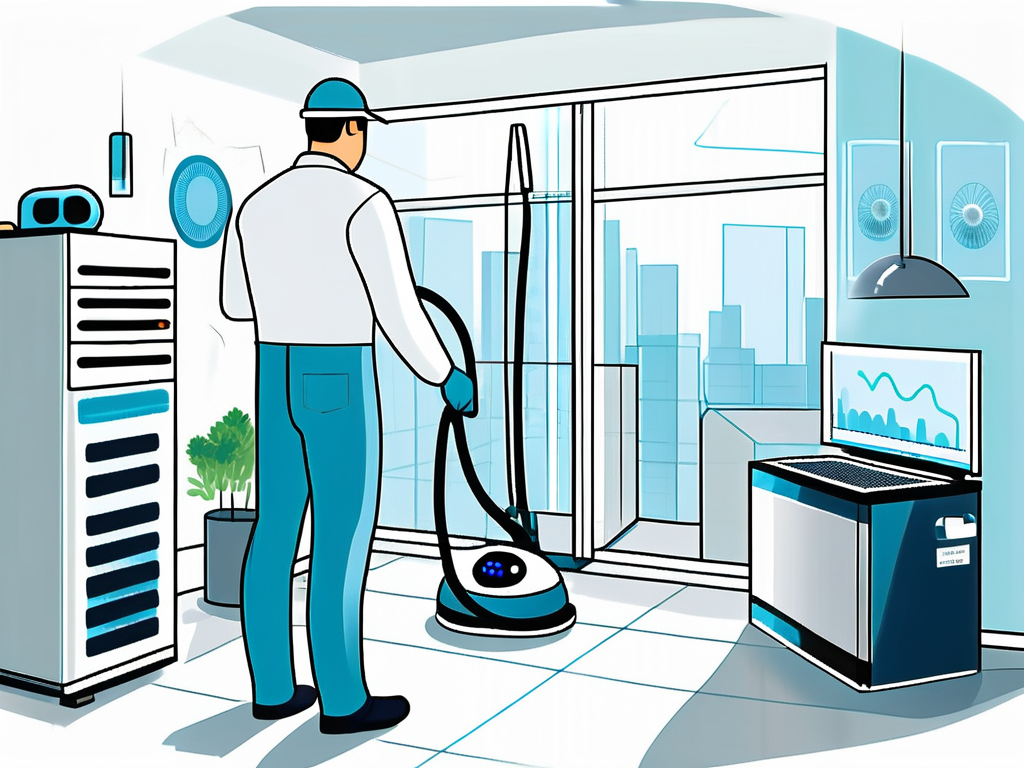Indoor air quality is a crucial aspect of maintaining a healthy and comfortable living environment. The air we breathe indoors can contain a range of pollutants that can have a detrimental effect on our health and well-being. Therefore, it is essential to understand the importance of indoor air quality and the role that professional services can play in improving it.
Understanding Indoor Air Quality
Indoor air quality refers to the level of pollutants present in the air inside a building. These pollutants can originate from a variety of sources, including chemicals, dust, mold, pet dander, and volatile organic compounds (VOCs). Poor indoor air quality can lead to various health issues, such as allergies, respiratory problems, and even long-term health conditions.
When it comes to indoor air quality, it’s not just about the visible particles floating in the air. Invisible gases like carbon monoxide and radon can also pose serious health risks if not properly monitored and controlled. Carbon monoxide, often produced by faulty heating systems or gas appliances, can be deadly in high concentrations. Radon, a naturally occurring radioactive gas that seeps into buildings through the ground, is a leading cause of lung cancer.
The Importance of Good Indoor Air Quality
Having good indoor air quality is vital for several reasons. Firstly, it promotes healthier living conditions for individuals and families, reducing the risk of respiratory problems and allergies. Second, it creates a more comfortable environment, allowing everyone to breathe easily and enjoy their living spaces. Lastly, good indoor air quality can also contribute to better sleep and overall well-being.
Moreover, maintaining good indoor air quality is not only beneficial for human health but also for the longevity of the building itself. High levels of moisture in the air can lead to mold growth, which not only affects air quality but also causes structural damage to the building over time. Proper ventilation and humidity control are essential in preventing these issues and ensuring a healthy indoor environment for occupants.
Common Pollutants Affecting Indoor Air Quality
Understanding the common pollutants that can affect indoor air quality is crucial in identifying potential issues and taking necessary measures to improve it. Some common indoor air pollutants include dust mites, pet dander, tobacco smoke, mold spores, pollen, and chemical fumes. These pollutants can have different sources, ranging from pets and household products to inadequate ventilation and water damage.
In addition to the pollutants mentioned, volatile organic compounds (VOCs) are another group of indoor air contaminants to be aware of. VOCs are emitted as gases from certain solids or liquids, such as paints, cleaning products, and furnishings. Prolonged exposure to high levels of VOCs can cause eye, nose, and throat irritation, as well as more severe health effects on the central nervous system and other organs.
The Role of Professional Services in Indoor Air Quality
When it comes to improving indoor air quality, professional services play a vital role. They have the expertise and tools to assess the air quality in a building, identify potential sources of pollution, and recommend appropriate measures to address them.

Professional services in indoor air quality are essential for maintaining a healthy and comfortable indoor environment. These experts are trained to understand the complexities of indoor air quality and how it can impact the health and well-being of occupants. By utilizing their knowledge and skills, professional services can help create a safer and more pleasant indoor space for everyone.
Types of Professional Air Quality Services
Professional air quality services typically offer a range of solutions tailored to meet the specific needs of each indoor space. These services can include air quality assessments, pollution source identification, air duct cleaning, humidity control, mold remediation, and installation of air purification systems. By offering a comprehensive range of services, professionals can effectively target the specific issues causing poor indoor air quality.
Additionally, professional services may also provide education and training to building occupants on how to maintain good indoor air quality. This proactive approach helps empower individuals to take an active role in preserving the air quality within their living or working environment, promoting a culture of health and well-being.
How Professionals Improve Indoor Air Quality
Professional air quality services employ various methods and technologies to improve indoor air quality. They use advanced equipment to measure pollutant levels and identify the sources of contamination. They also provide effective solutions such as air filtration systems, ventilation improvements, and the use of environmentally friendly cleaning products. Professionals can create a customized action plan to address the specific air quality concerns of each building, ensuring long-lasting results.
Moreover, professional services stay updated on the latest trends and developments in indoor air quality management. This ongoing commitment to learning and improvement enables them to offer cutting-edge solutions that are both effective and sustainable, keeping indoor environments healthy and safe for years to come.
Selecting the Right Air Quality Service
Choosing the right air quality service provider is crucial for achieving the desired results. Here are some factors to consider when selecting a service:

When it comes to selecting an air quality service, experience and expertise play a significant role in ensuring that your indoor air quality concerns are addressed effectively. A provider with a proven track record in conducting thorough indoor air quality assessments and offering tailored solutions can give you peace of mind.
Reputation is another key factor to keep in mind. Reading customer reviews and testimonials can provide valuable insights into the quality of service offered by a particular provider. Positive reviews highlighting prompt responses, effective solutions, and excellent customer service are indicators of a reliable air quality service provider.
Factors to Consider When Choosing a Service
- Experience and expertise in indoor air quality assessments and solutions
- Reputation and customer reviews
- Certifications and licensing
- Availability of comprehensive services
- Competitive pricing
When evaluating potential air quality service providers, certifications and licensing are non-negotiable aspects to consider. These credentials demonstrate that the provider meets industry standards and possesses the necessary qualifications to address indoor air quality issues effectively.
Additionally, the availability of comprehensive services is essential. A reputable air quality service provider should offer a range of services, including air quality testing, mold remediation, ventilation system cleaning, and more, to cater to diverse needs under one roof.
Questions to Ask Potential Service Providers
Before hiring an air quality service provider, it is essential to ask the right questions to ensure they can meet your specific needs. Some important questions to ask include:
- What services do you offer to improve indoor air quality?
- How do you assess the air quality in a building?
- Do you have certifications or accreditations?
- Can you provide references or customer testimonials?
- What is your pricing structure?
Asking about the provider’s approach to assessing air quality in a building is crucial. A reliable service provider should utilize advanced tools and techniques such as air sampling, moisture detection, and thermal imaging to conduct a comprehensive assessment and identify potential issues accurately.
Furthermore, inquiring about the pricing structure upfront can help you avoid any surprises later on. Transparent pricing that outlines the cost breakdown for different services and any additional fees ensures clarity and helps you make an informed decision based on your budget and requirements.
The Process of Improving Indoor Air Quality
The process of improving indoor air quality typically involves several steps. It begins with an initial air quality assessment and ends with ongoing maintenance and monitoring.
Initial Air Quality Assessment
During the initial assessment, professionals will evaluate the indoor air quality and identify any potential sources of pollution. This may involve measuring pollutant levels, inspecting ventilation systems, and conducting visual inspections for signs of mold or other contaminants. Based on the findings, a comprehensive action plan can be developed to address the identified issues.
Implementation of Air Quality Solutions
After identifying the sources of pollution, professionals will implement appropriate solutions to improve indoor air quality. This may include cleaning and disinfection, repairing or replacing damaged ventilation systems, and installing air purifiers or filters. These solutions are tailored to the specific needs and requirements of each building, ensuring optimal results.
Ongoing Air Quality Maintenance
Maintaining good indoor air quality is an ongoing process. Professionals can provide regular maintenance and monitoring services to ensure that the implemented solutions continue to perform effectively. This may involve regular filter replacements, air duct cleanings, and periodic air quality assessments. Ongoing maintenance helps to prevent the reoccurrence of air quality issues and ensures long-term benefits for occupants.
The Benefits of Professional Indoor Air Quality Services
Utilizing professional indoor air quality services offers numerous benefits for both individuals and businesses.

Health Benefits of Improved Air Quality
Improved indoor air quality directly contributes to better health outcomes. By reducing the presence of pollutants and allergens, individuals are less likely to experience allergies, respiratory issues, and other related health problems. Good indoor air quality supports overall well-being and can enhance productivity and performance, particularly in work or educational environments.
Long-Term Cost Savings of Professional Services
Investing in professional indoor air quality services can lead to long-term cost savings. By eliminating or reducing the sources of pollution, individuals can avoid medical expenses associated with poor air quality-related health conditions. Additionally, improved air quality can result in more efficient HVAC systems, leading to reduced energy consumption and lower utility bills.
Peace of Mind with Professional Services
Hiring professional air quality services provides peace of mind for individuals and businesses. Knowing that experts are addressing indoor air quality concerns and implementing effective solutions allows occupants to feel confident in their living or working environment. Professional services offer a comprehensive approach to indoor air quality improvement, ensuring that all aspects are taken care of with expertise and professionalism.
Improving indoor air quality is essential for creating a healthy and comfortable living environment. By understanding the importance of indoor air quality, recognizing common pollutants, and utilizing professional services, individuals and businesses can take proactive steps toward ensuring optimal indoor air quality and enjoying the benefits it brings.



